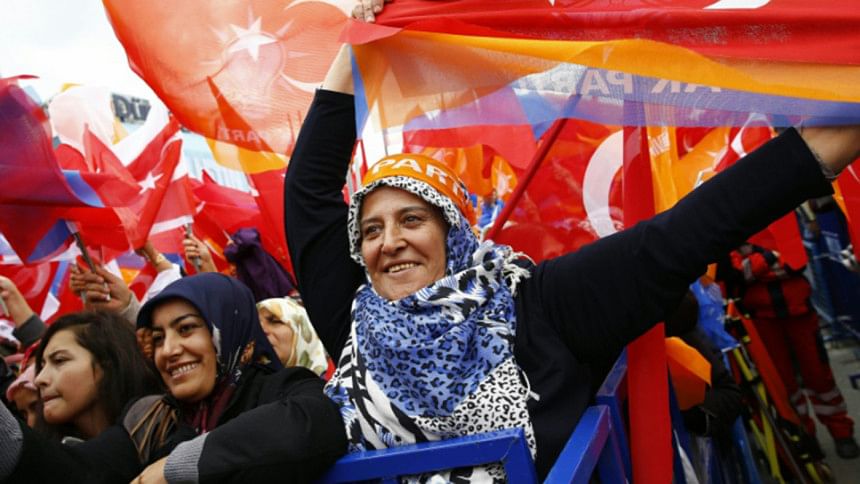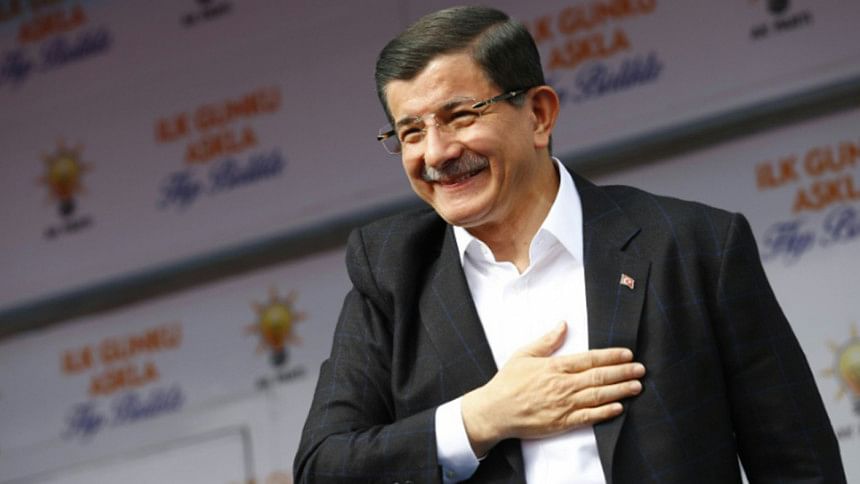Turkey votes in critical election as violence spirals

Polling stations opened in eastern Turkey on Sunday for one of the most crucial elections in years, as the deeply divided country confronts a bloody wave of jihadist attacks and a renewed Kurdish conflict.
Some 54 million people are registered vote at 175,000 polling stations, from 7:00am to 4:00pm (0400 GMT to 1300 GMT) in the east and from 8:00am to 5:00pm (0500 GMT to 1400 GMT) in the west.
The poll is the second in only five months, called after the Justice and Development Party (AKP) lost its parliamentary majority in June for the first time in 13 years of single-party rule and then failed to forge a power-sharing government.
Opinion polls are, however, predicting a replay Sunday, leaving the strategic Muslim-majority nation at risk of further instability just as it is facing what some observers warn are existential threats.
Turks are fearful of a return to all-out war with outlawed Kurdistan Workers' Party (PKK) rebels after renewed violence shattered a 2013 truce in July, just a month after a pro-Kurdish party took up seats in parliament for the first time.
The threat of further jihadist violence is also overshadowing the election after a string of attacks blamed on the Islamic State group, including twin suicide bombings on an Ankara peace rally that killed 102 people -- the worst in the country's modern history.
'Strong, shrewd government'
President Recep Tayyip Erdogan's Islamic-leaning AKP is tipped to win between 40 and 43 percent of the vote, paving the way either for a shaky coalition that many analysts say will not last long, or yet another election.
With the country polarised along ethnic and sectarian lines and its economy faltering, Prime Minister Ahmet Davutoglu called Saturday on voters to choose "stability".
"Turkey needs a strong and shrewd government at such a critical time," said Davutoglu, whose own job could be at risk if the AKP fails to secure an outright victory.

"We will definitely clear Turkey of terror, fighting, violence and hostility. We will never make concessions on democracy, freedom and rights."
The vote could also determine the future of Erdogan, who has dominated Turkey's political scene for more than a decade, even though his name is not on the ballot paper.
The stunning June election setback wrecked -- at least temporarily -- his ambition to expand his role into a powerful US-style executive presidency that opponents fear would mean fewer checks and balances on a man seen as increasingly autocratic.
'End one-man rule'
A string of high-profile raids against businesses deemed hostile to Erdogan and the jailing of critical journalists have set alarm bells ringing about the state of democracy in a country that has long aspired to join the European Union.
Opposition leaders say voters should sound the death knell for "one-man rule".
"The culture of compromise is one of the basic rules of democracy," said Kemal Kilicdaroglu, leader of the social-democrat Republican People's Party. "But if someone imposes his own laws, that becomes a source of tension."
A total of 54 million Turks are registered to vote, but observers say fatigue has set in, and the run-up to the election has been much more low-key than the frenzied campaigning ahead of the June poll, when turnout was 84 percent.
Security remains the paramount concern after the Ankara attack, which prosecutors say was carried out by an IS sleeper cell to disrupt Sunday's election.
Police have rounded up scores of IS suspects amid media reports the jihadists could be planning a spectacular attack such as a hijacking.
Around 385,000 police and gendarmes will be on the streets, many in the restive Kurdish areas of the country.
"In the southeast, the escalated violence has impacted the ability of electoral contestants to campaign freely," the Organisation for Security and Cooperation in Europe (OSCE) said this week.
Ankara, increasingly isolated on the world stage, is also struggling with its policy on Syria and the burden of more than two million who have taken refuge from its neighbour's bloody four-year civil war.
HDP made history
After long supporting rebels fighting the Damascus regime, it was cajoled into joining the US-led coalition against the IS group and launched its own "war on terrorism" targeting the jihadists as well as PKK fighters.
Further political turmoil could also add to jitters about Turkey's economy, with growth slowing sharply from the dizzy heights of five years ago and the Turkish lira plunging more than 25 percent this year.
All eyes will again be on the Peoples' Democratic Party (HDP), which made history in June when it became the first pro-Kurdish movement in parliament and gained enough seats to block an AKP majority.
But it faces accusations it is a mere front for the PKK, whose armed campaign for autonomy has killed 45,000 people since 1984.
Analysts expect the AKP to try to form a coalition with at least one other party in the event of another hung parliament, probably the CHP, which came second in June.
Nationalist Movement Party (MHP) leader Devlet Bahceli ruled out a partnership with the AKP and said he would engage in dialogue with the HDP.
"The most likely scenario is more of the same -- turbulence," European Council on Foreign Relations analyst Asli Aydintasbas.
The outcome could leave Turkey without a government as it hosts world leaders, including US President Barack Obama, for the G20 summit in the Mediterranean resort of Antalya on November 15-16.
Voting will take place at 175,000 polling stations, from 7:00 am to 4:00 pm (0400 GMT to 1300 GMT) in the east and from 8:00 am to 5:00 pm (0500 GMT to 1400 GMT) in the west of the country.

 For all latest news, follow The Daily Star's Google News channel.
For all latest news, follow The Daily Star's Google News channel. 



Comments